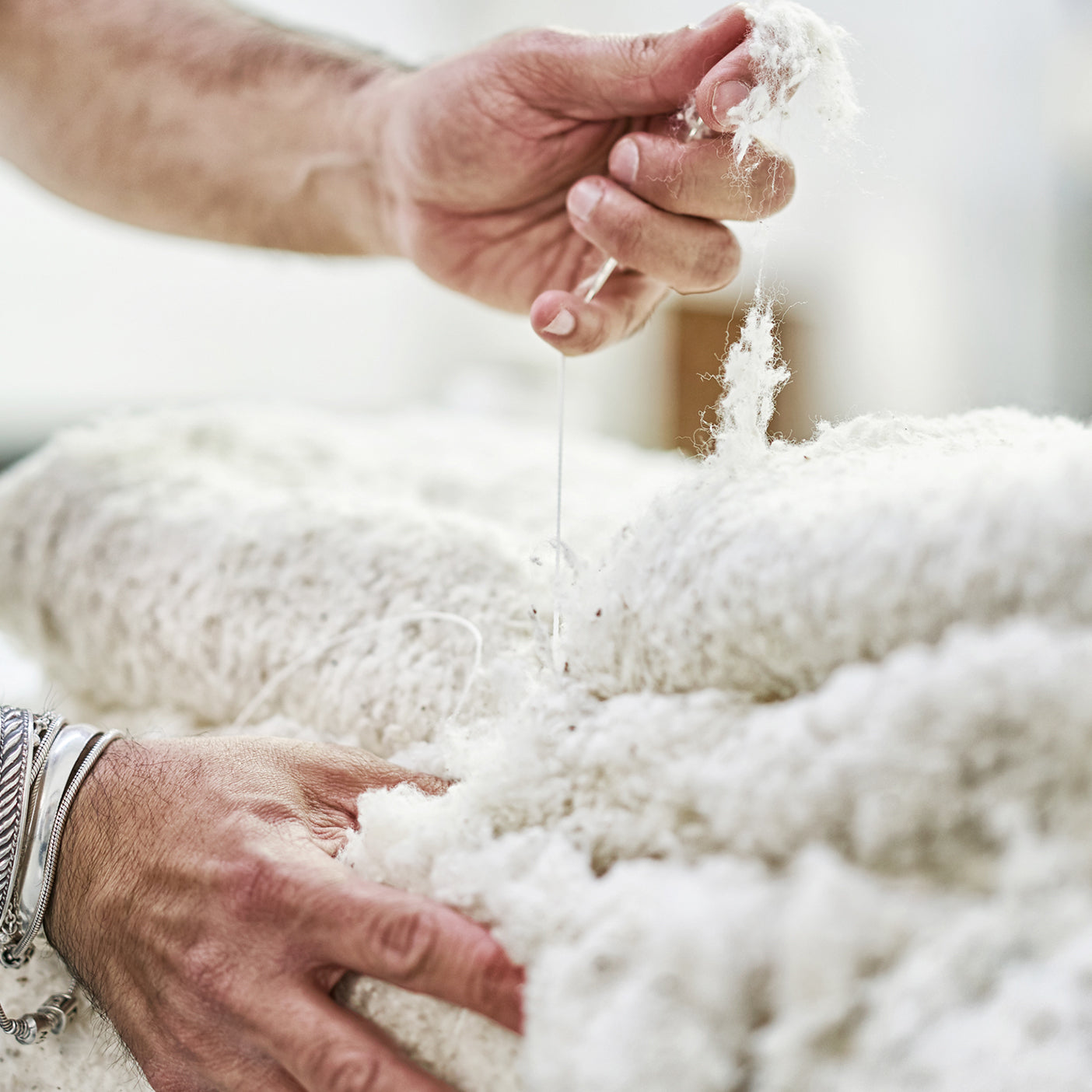What if you could significantly impact the planet with just a few small changes in your daily life? As concerns about climate change, waste, and resource depletion rise, sustainable living has gained significant traction. Sustainable living isn’t just about making enormous sacrifices; it’s about integrating eco-friendly habits into your day-to-day routine. Simple lifestyle shifts can reduce your carbon footprint, conserve resources, and promote a healthier, more balanced way of life. This blog will explore five small, actionable changes to help you live sustainably and contribute to a greener future.
Switch to Natural Fiber Home Textiles

Imagine the fabrics you sleep on or wrap yourself in daily: are they working with or against your health and the environment? Switching to natural fiber home textiles can have a profound impact on both. Let’s break down why this simple switch can be transformative:
-
Health Benefits:
Synthetic textiles often contain chemicals like formaldehyde, flame retardants, and artificial dyes that can cause skin irritation, allergies, and even disrupt hormones. Additionally, when washed, synthetic fabrics release microplastics in our oceans, threatening marine ecosystems and human health. On the other hand, natural fibers such as organic cotton, linen, wool, and Tencel are hypoallergenic, gentle on the skin, and free from harmful chemicals. -
Sustainability Benefits:
Environmentally sustainable natural fibers provide far beyond the health benefits. Let’s take organic cotton as an example. Growing organic cotton uses 91% less water than conventional cotton. This is crucial considering the world’s growing water scarcity crisis. Also, organic cotton uses significantly fewer pesticides, reducing soil degradation and pollution in water bodies.
At Delara, we champion the use of natural fibers, offering products that blend sustainability with luxury. Our customers, like Sarah, have seen first-hand the benefits. This is what she shared with us:
"I used to suffer from skin irritation with my synthetic sheets, but since switching to Delara’s organic cotton bedding, I sleep comfortably, and I feel good knowing I’m making an eco-friendly choice."
Sarah’s story is one of many where a simple switch to natural fiber bedding made a tangible difference. Natural materials' breathable, soft feel ensures a better sleep experience while contributing to sustainable living.
Energy Efficiency: Small Tweaks for Big Savings

Every time you flip a light switch, power a device, or adjust your thermostat, you're consuming energy—energy that, if wasted, contributes to greenhouse gas emissions and climate change. According to the U.S. Department of Energy, the average household spends over $2,000 annually on energy costs, with heating and cooling accounting for nearly half of that figure. Imagine cutting a significant portion by simply being more mindful about your energy use. A 10-20% reduction in household energy consumption is achievable and can be done without sacrificing comfort or convenience. Let’s explore three easy, data-backed ways to boost energy efficiency at home.
-
Use LED Bulbs:
LED (Light Emitting Diode) bulbs are up to 75% more energy-efficient than traditional incandescent bulbs and last 25 times longer. Start small by replacing the most frequently used lights in your home, such as those in the kitchen, living room, and bedroom. The initial cost of LED bulbs may be higher, but their long-term savings—both in energy costs and replacement frequency—make up more than the cost. -
Unplug Electronics When Not in Use:
Even when your devices are turned off, many continue to draw power—often called "phantom" or "vampire" power. This invisible energy drain accounts for roughly 5-10% of household electricity use, adding unnecessary costs to your bills and contributing to energy waste. Make it a habit to unplug chargers, gaming consoles, and kitchen appliances when not in use. -
Install Smart Thermostats:
Heating and cooling are responsible for nearly 50% of the energy use in an average American home. Often, we heat or cool spaces when it's not necessary—such as when we’re asleep or away from home. Smart thermostats help by learning your schedule and preferences and optimizing the temperature to save energy without sacrificing comfort.
Reducing Plastic Use in the Kitchen and Beyond

Plastic waste is one of the most critical environmental issues we face today. Every year, over 8 million tons of plastic go into the ocean, breaking down into microplastics that harm marine life and pollute ecosystems. Once in the sea, plastic is nearly impossible to remove and can take up to 1,000 years to decompose. This affects wildlife and human health as microplastics enter the food chain.
The good news? You have the power to help reduce plastic pollution right in your kitchen and everyday life. By making a few simple swaps, you can significantly reduce the amount of plastic you consume—and the planet will thank you. Here are some actionable tips to reduce plastic use:
Replace Plastic Wrap with Beeswax Wrap:
Plastic wraps are convenient but disposable, adding to the ever-growing plastic waste problem. Instead, switch to beeswax wraps, which are reusable, moldable, and can last up to a year with proper care. Beeswax wraps are perfect for covering bowls, wrapping sandwiches, or storing leftovers, just like plastic wrap—but without the waste.
Bring Reusable Bags to Grocery Stores:
Make it a habit to keep a few reusable bags in your car or by the door so you never forget them when heading to the store. Encourage your family or friends to do the same by gifting them reusable bags that are both functional and stylish.
Promote Brands Like Delara that Recycle Plastic:
Did you know that some companies creatively address plastic waste by repurposing it into new, beautiful products? Delara, for instance, goes beyond natural textiles and incorporates recycled plastic into its products. From washable rugs to outdoor rugs and throw pillow covers, Delara’s eco-friendly offerings show that plastic waste can be transformed into functional, durable, and aesthetically pleasing home decor. It helps you contribute to a circular economy that reduces waste by continually repurposing materials.
Eco-Friendly Cleaning

According to the U.S. Environmental Protection Agency (EPA), indoor air can be 2 to 5 times more polluted than outdoor air, partly due to the chemicals in conventional cleaning products. Additionally, cleaning agents account for approximately 6% of volatile organic compound (VOC) emissions, contributing to smog and air pollution. Switching to natural, non-toxic cleaning alternatives significantly reduces exposure to these harmful substances and lowers your environmental footprint. Here is how you can start eco-friendly cleaning at home:
DIY Cleaning Solutions:
Why spend money on chemical-laden cleaners when you can make eco-friendly versions at home? Simple household ingredients like vinegar, baking soda, and essential oils can be just as effective.
Opt for Eco-Friendly Brands:
Besides DIY options, many brands now offer biodegradable, plant-based cleaning products that are both effective and safer for the environment. Look for products labeled as non-toxic, cruelty-free, and made from natural ingredients.
Support Ethical and Sustainable Brands
Every dollar you spend is a vote for the world you want to live in. Choosing ethical and sustainable brands directly supports companies prioritizing fair trade, eco-conscious production methods, and high-quality, durable products. These brands often have more transparent supply chains and minimize their environmental impact through responsible sourcing, labor practices, and production methods. This conscious consumerism helps protect the planet and encourages more businesses to adopt sustainable and ethical practices.
For instance, Delara produces high-quality, durable bedding from sustainable materials like organic cotton. Delara is committed to delivering premium, GOTS-certified natural fiber textiles, ensuring our products meet the highest sustainability standards. Here’s how choosing Delara can help you in sustainable living innovation and save money on an investment in bedding and home décor:

A Delara customer, Anna, shared her experience: "I’ve loved my Delara sheets so much that I took them to my new home. They're durable and comfortable, and I love that they’re eco-friendly." This shows customers are more attracted to brands like Delara that focus on eco-conscious production. We create products that are made to last—helping to reduce textile waste in landfills. Choosing us allows you to contribute to a better future for both people and the planet.
Conclusion
Sustainable living doesn’t require grand gestures or expensive investments; it starts with small, mindful changes in everyday life. By switching to natural fiber home textiles, adopting energy-efficient habits, reducing plastic use, choosing eco-friendly cleaning solutions, and supporting sustainable brands, you can make a significant difference for the planet. Take the first step toward a sustainable lifestyle today by exploring Delara’s eco-friendly bedding and home decor products.









Leave a comment